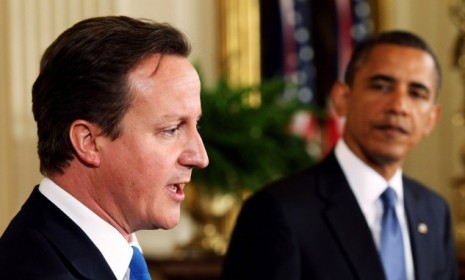Britain's 'radical' spending cuts: A blueprint for the U.S?
The British government will slash spending on everything from welfare to defense in order to tackle its $150 billion deficit. Will America take heed?

A free daily email with the biggest news stories of the day – and the best features from TheWeek.com
You are now subscribed
Your newsletter sign-up was successful
Britain's new government has unveiled a "radical" package of spending cuts to tackle its £100 billion ($150 billion) deficit that will result in as many as 490,000 public sector employees losing their jobs. All in all, Prime Minister David Cameron will cut spending by 19 percent (or $130 billion) over the next four years, a move projected to eliminate the country's structural deficit by 2015. Should the U.S., now adding more than $1 trillion annually to national debt, take a lesson from Britain's punishing cuts? (Read David Frum on David Cameron)
At very least, we should be paying attention: With its "legion of international banks," says Derek Thompson at The Atlantic, Britain faced a similar crisis to the U.S: "Years of overspending and financial wizardry coming to a crashing halt in 2008." But where the U.S. has gone for "moderate stimulus and high deficit-spending," Britain has instead chosen "stiff-upper-lip" spending cuts. This will be an "interesting case study" for us.
"Why Britain's age of austerity is so important"
The Week
Escape your echo chamber. Get the facts behind the news, plus analysis from multiple perspectives.

Sign up for The Week's Free Newsletters
From our morning news briefing to a weekly Good News Newsletter, get the best of The Week delivered directly to your inbox.
From our morning news briefing to a weekly Good News Newsletter, get the best of The Week delivered directly to your inbox.
The U.S. needs to follow Britain's lead: We know Obama doesn't believe "belt-tightening is the way to prosperity," says Veronique de Rugy at the National Review. But "stimulus spending hasn't helped the country recover so far." The U.S. should "change its course" and take a leaf out of Britain's book. "Let's give spending cuts a chance." It worked for us after World War II, didn't it?
"What's so different about the U.S. that we can't cut spending?"
Actually, it ought to be the other way around: Britain should be looking to us, says Joseph Stiglitz in The Guardian. America's stimulus package worked, despite being "too small and poorly designed." Unemployment in the U.S. is much lower than "what it otherwise would have been -– over 12 percent." Austerity at a time of recession "lowers GDP and increases unemployment." Britain is making a mistake and we shouldn't duplicate it.
"To choose austerity is to bet it all on the confidence fairy"
A free daily email with the biggest news stories of the day – and the best features from TheWeek.com
-
 The Epstein files: glimpses of a deeply disturbing world
The Epstein files: glimpses of a deeply disturbing worldIn the Spotlight Trove of released documents paint a picture of depravity and privilege in which men hold the cards, and women are powerless or peripheral
-
 Jeff Bezos: cutting the legs off The Washington Post
Jeff Bezos: cutting the legs off The Washington PostIn the Spotlight A stalwart of American journalism is a shadow of itself after swingeing cuts by its billionaire owner
-
 5 blacked out cartoons about the Epstein file redactions
5 blacked out cartoons about the Epstein file redactionsCartoons Artists take on hidden identities, a censored presidential seal, and more